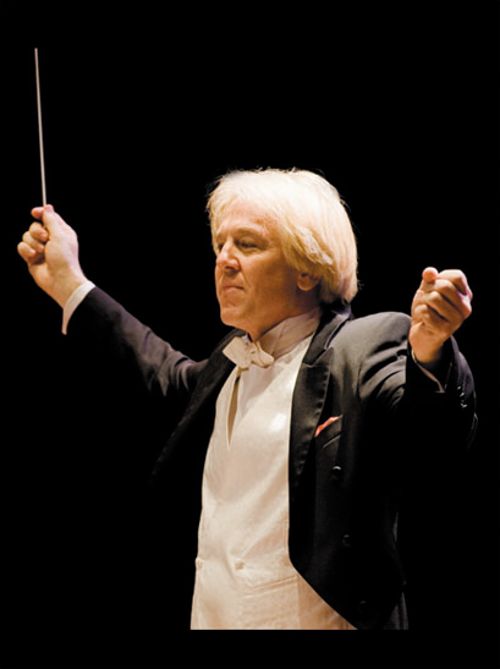Texas Music Festival opens with sonic spectaculars by Strauss and Holst

Franz Anton Krager conducted the Texas Music Festival Orchestra Saturday night at the University of Houston’s Moores Opera House.
On paper, the pairing may have looked like overkill. Richard Strauss’ Also Sprach Zarathustra and Gustav Holst’s The Planets, two symphonic blockbusters, comprised the first orchestral program of this year’s Texas Music Festival. Can there be too much sonic spectacle?
Yet go back to both works’ origins and a deeper kinship appears. Both pieces revel in depicting human life’s joys, upheavals and mysteries. Zarathustra springs from Nietzsche’s eponymous philosophy treatise; The Planets looks at life through the lens of astrology. Both scores put darkness and brooding alongside theatrics, and both works end on a questioning, inconclusive note.
Conductor Franz Anton Krager and the Texas Festival Orchestra seized on the scores’ inherent drama and sonic power Saturday in the University of Houston’s Moores Opera House.
The most explosive passages exerted a raw force that registered in one’s ribcage, not just the ears. With a vigorous, 95-member orchestra cutting loose in a compact, 800-seat theater, visceral impact may have been inevitable.
Each work has its rich, sonorous episodes. But the orchestra leaned toward dynamism and brilliance–even ferocity, at times–more than precision or subtlety. One woman listened to much of The Planets with her fingers and sweater plugging her ears.
It bears noting that the musicians had never met until a few days before the concert. The Texas Music Festival brings together college and conservatory students–this year, hailing from 21 states and seven other countries–to spend a month operating the way professionals do. That is, they rehearse and perform a fresh program each week. The pace is much quicker than they would typically experience in their school orchestras.
On Saturday, the scores’ broad strokes and boldest colors registered more potently than details. That held true particularly in Zarathustra, where the most virtuosic passages are woven together from instruments dashing and vaulting in independent directions. The orchestra put across the surges of energy and washes of color rather than the cross-currents.
In Zarathustra, the famous Sunrise introduction blazed despite a little disunity at its climax and the orchestra gave the fanfare a thunderous reprise at the close of “Of Science and Learning.” Concertmaster Diane Yang, a University of Michigan student, led the way with lusty violin solos in “The Dance Song,” and the strings glowed in the lyrical meditation near the end of “Song of the Night Wanderer.”
But when the central string players tried to sing out in “Of Those in Backwaters,” Zarathustra’s first burst of melody, the much-less-important organ part competed with them rather than accompanying discreetly. The quiet fugue in “Of Science and Learning” had a walking-on-eggshells feel instead of darkness and depth. At the very end, the stratospheric string-and-woodwind chords sounded piercing, not ethereal.
The Planets let Krager and the orchestra unleash even more raw force than Zarathustra. Snarling brasses and walloping percussion drove home the brutality of “Mars, the Bringer of War.” Later, “Uranus, the Magician” began with an echo of that aggressive tone. Then the orchestra put more emphasis on hale-and-hearty energy, beginning as soon as the lusty bassoons set the dance in motion.
“Venus, the Bringer of Peace” didn’t shimmer as it can, but it gained lushness as it unfolded, and that established the serene atmosphere. “Jupiter, the Bringer of Jollity” brought a burst of red-blooded vigor, and the orchestra draped the middle section’s big tune in sumptuous tones.
“Saturn, the Bringer of Old Age” moved spaciously, but it always had momentum, and the gradual swell in the sound made the increasing infirmities of age seem all the more inexorable.
The orchestra didn’t quite have the delicacy and transparency to make “Neptune, the Mystic” seem otherworldly as it should. And in the final pages, the Festival Women’s Chorus sounded far too present–which it was, perched on a catwalk above the audience–rather than distant and disembodied.
Texas Music Festival faculty members will play chamber works by Aaron Copland, Leonard Bernstein, Libby Larsen and Robert Schumann at 7:30 p.m. Tuesday in the University of Houston’s Dudley Recital Hall. 713-743-3388; uh.edu